"Slaying the Stage: When Nerves Meet Awesomeness"
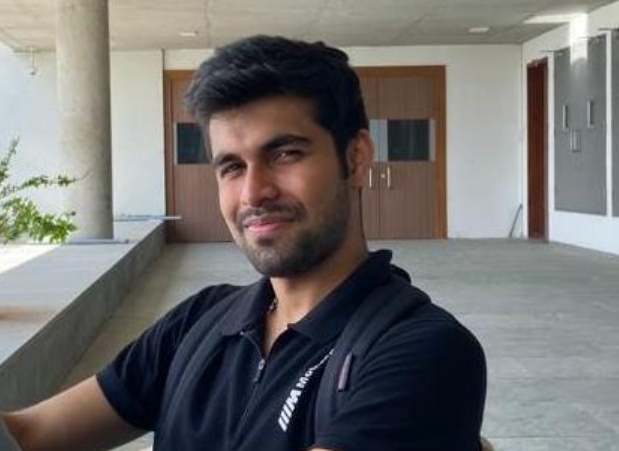 Harsh Sharma
Harsh Sharma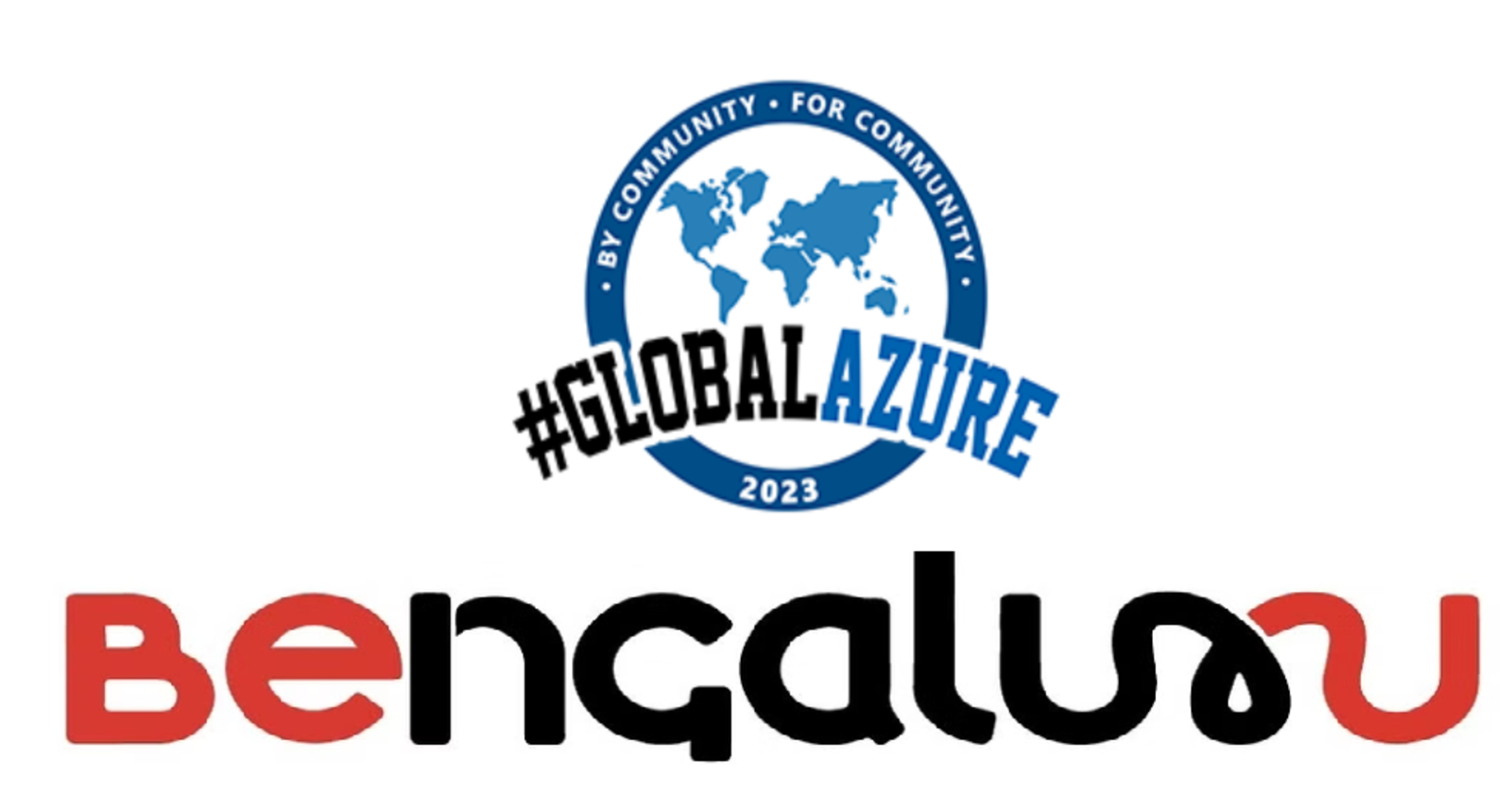
It feels like a dream come true to be able to write this post. I had the great opportunity to present my talk on Global Azure Day 2023 at the Microsoft Research Office on May 13, 2023. It was my first time attending a conference. To be honest, the prospect of speaking at a conference exceeded my greatest dreams. While not identifying as shy or introverted, the prospect of speaking in front of a large group of people made me nervous.
I overcame my worries and managed to do what appeared impossible, despite all circumstances.
Here is a picture as evidence, in case you still have any questions 😅:
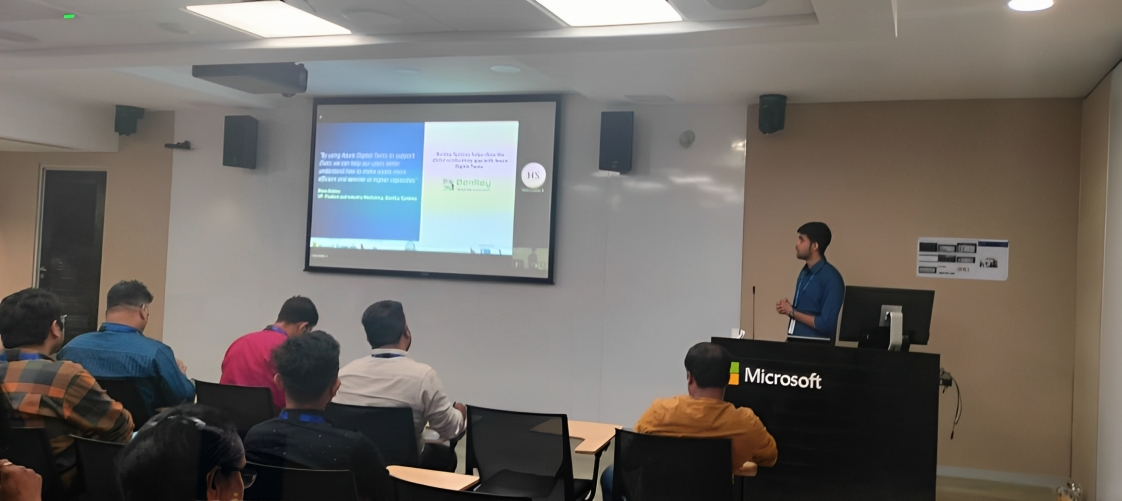
In this article, I'd like to discuss my experience: why I did it, how I prepared, how it went, and what I learned. The conference will be secondary to my own experience.
What brought me here?
I joined Vellore Institute of Technology, Vellore, in the year 2019 to pursue my bachelor's in computer science with specialization in data science. Owing to the epidemic, my course was cut down to three and a half years, and I finished my credits in September 2022. Since then, I have been working as an intern at Nokia, where I have been working on pipeline design and data processing for Nokia's ZTS technology, where my work revolves around machine learning algorithms and dockers.
Last year, I also received an offer from Eli Lilly, one of the most well-known pharmaceutical companies in the United States.
With my start date somewhere in July 2023, I had plenty of time to explore the ever-expanding world of open source, conferences, and so on. Twitter and LinkedIn were the most valuable resources for me to understand more about what was going on in this world.
After months of networking and researching platforms for aspiring developers, a friend suggested I look into CFPs.
What is a CFP?
A call for proposals conference, also known as a call for papers conference, is an event that invites academics, scholars, professionals, and specialists to submit proposals or abstracts for presentations, seminars, or speeches on a specific topic or theme. The conference organizers release a "call for proposals" to gather responses from individuals or organizations who are interested. A call for proposals conference's goal is to promote participation and collect a wide range of ideas and research findings from various disciplines of study or industry sectors. These conferences frequently have a particular concentration or theme, such as technology, science, education, business, or the social sciences.
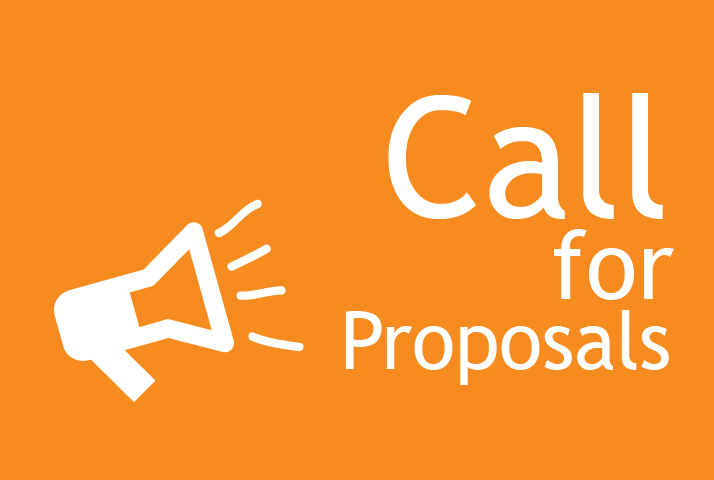
When a call for proposals is issued, interested presenters are usually required to submit an abstract or summary of their intended presentation, summarising the main topic, objectives, methods, and anticipated outcomes. A panel of experts or the conference organizing committee then reviews and evaluates the abstracts. A set of ideas is chosen for presentation at the conference based on the review process. Presenters whose applications are accepted are normally invited to give a presentation, display a poster, or take part in a panel discussion at the conference. This allows them to share their findings, thoughts, and experiences with a larger audience, which may include colleagues, academics, industry experts, and policymakers.
Call for Proposals Conferences are essential for encouraging collaboration, knowledge sharing, and the promotion of research and new ideas within a specific sector or discipline. They are used to network, learn, and gain visibility among peers and possible partners.
How to submit one?
There are so many conferences every weekend that one can easily come up with a proposal. After extensive research, I discovered a couple of sites that accepted CFPs. I began applying in April, and to be honest, I had no idea what a proposal was. Yet, each conference offers various tracks that will assist you in developing your conference idea.
Trying to come up with a proposal for Global Azure Day 2023 came fairly naturally to me. With so many courses available on the website, it was easy for me to select Data Analytics, AI, and IoT, as my entire undergraduate experience, as well as my internship, revolved around these three domains.
I had entirely forgotten about the CFP after applying, and then on May 10, 2023, I received an email stating that my talk had been accepted.
Happy, thrilled, and feeling on top of the world.
Yet I only had three days to prepare for my presentation. Anxiety set in.
How to prepare for the talk?
If it is your first time speaking in front of an audience, then the experience can be a bit nerve-wracking. And for me, it was even worse with only three days to prepare for it. Since I had never prepared and delivered a talk, many questions rushed through my mind:
How do I start?
What topics should I cover in 45 minutes?
How can I make the talk more engaging?
How should I prepare for the questions raised by the audience?
How many slides should I have for a 45-minute talk?
How can I make it not sound like a marketing campaign? ...and many more
After performing extensive research and consulting with others who had previously presented at events, I began planning my talk. I spent about two days putting together the presentation and gathering feedback from my coworkers. I applied the input with just over a day until the start of the conference. I began rehearsing the presentation to ensure that it went successfully. With no time to spare, I started practicing at least three times every day. It was mentally taxing. If there is such a thing as too much practice, I did it. But I don't regret it because it helped me deliver the speech flawlessly.
Delivering the talk on Conference Day
The day had finally come for me to speak at my first conference. Although my session was planned for 11:45 a.m., I nevertheless showed up at the Microsoft Research Center at 8 a.m. to gauge the audience size and observe speakers whose speeches were scheduled before mine.
The crowd was huge. Out of the 800+ attendees that registered for the event, 300+ showed up at the location. I was the only speaker who was still a student among all the seasoned experts who spoke. Wriju Ghosh, Cloud Solution Architect, Microsoft UK, gave the opening keynote address at 9:30 a.m. Finally, the moment had come for me to give my speech.
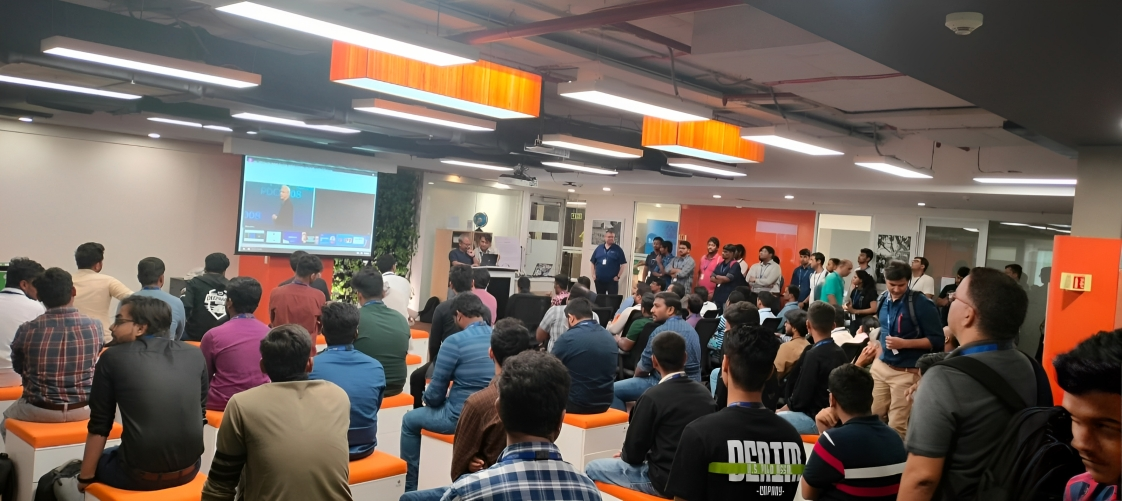
There were three rooms designated for the speech, and out of them, the room where I gave my speech had both college students and a large number of experienced professionals there. I felt a little uneasy as I took in my surroundings. And this is the extent of my memories. The 45 minutes passed quickly because of my anxiety, and I don't recall most of what I did or said. I still have faith that I spoke clearly and appropriately.
After leaving the "stage," my memory picks back up. It was a mixed bag of emotions, including self-confidence, a sense of accomplishment, and satisfaction. I was ecstatic and in disbelief that I had succeeded. It seemed like a major victory.
"Unleashing the Power of Data Analytics, AI and IoT "
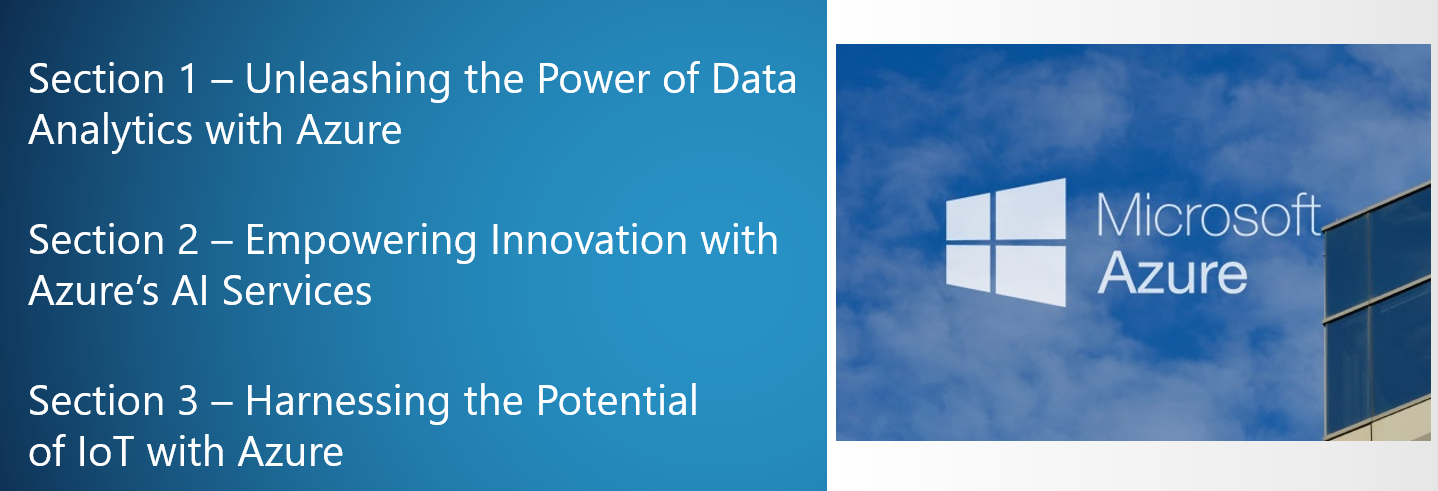
As a speaker, I have had the incredible opportunity to share my insights and experiences on a topic that resonates deeply with the challenges and opportunities organizations face in the digital age. During my speech, I explored how Azure's comprehensive suite of services enables organizations to leverage data analytics, AI, and IoT synergistically. Through real-world examples and case studies, I showcased the tangible benefits of Azure in driving innovation, improving operational efficiency, and achieving tangible business outcomes.
In today's fast-paced and highly competitive landscape, data has evolved into the lifeblood of organizations across industries. Its ability to unveil valuable insights and shape strategic decision-making processes has become a crucial factor in driving innovation and operational excellence. During my talk, I dove into the realm of data-driven strategies, with a particular focus on the unparalleled capabilities offered by Azure, Microsoft's comprehensive suite of services: Azure Synapse Analytics, Azure Data Factory, and Azure HDInsight.
Azure's AI services provide an exciting avenue for organizations to embrace the power of artificial intelligence and machine learning. I discussed Azure Machine Learning and how it empowers data scientists and AI developers to build, train, and deploy models at scale.
Lastly, I shed light on Azure's IoT offerings, showcasing how organizations can harness the IoT revolution. Azure IoT Hub and Azure Digital Twins provide the framework for securely connecting, monitoring, and managing IoT devices at scale.
Through my speech, I aimed to inspire the audience to embrace the power of data-driven transformation and embark on their journey towards success in the ever-evolving landscape of the modern business world.
Conclusion - My Experience
Meeting accomplished experts in person was the highlight of the experience. I have to mention that it was wonderful meeting everyone because they were all so kind and helpful. I had a great time!
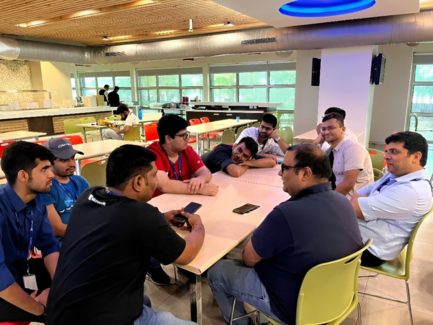
I was able to conquer my public speaking phobia, which is the second-best thing about it. Because I always believed that was not for me, I never even considered giving a public speech before. I'm too timid to speak in front of an audience. I was never drawn to it, either. Yet after I finished it, my perspective was altered. I felt much more confident, and if given the chance, I would love to deliver a talk again.
In addition, I could listen to other speakers' speeches and pick up knowledge from them. All of the presentations at the seminars I attended were made by expert presenters, so I was able to pick up a few tips. It was wonderful to hear from the people I've only ever seen online.
Thank you for reading my blog. I'm hoping that this article will enable you to learn more about CFPs. I also want to express my gratitude to Samik Roy and Lalit Rawat for giving me the chance to speak at Global Azure Day 2023.
Subscribe to my newsletter
Read articles from Harsh Sharma directly inside your inbox. Subscribe to the newsletter, and don't miss out.
Written by

Harsh Sharma
Harsh Sharma
I strongly believe in applying theoretical knowledge, and hence I have ensured to maximize my learning on projects during my time at organizations I have worked for and am currently working for. My first breakthrough was the summer internship that I did at Readyly, a New York-based startup, where I worked on an efficient ticket management software to provide an organization's customer support team with insights about team performance and provide agents with customer details to streamline customer query solving. I not only gained valuable exposure to machine learning algorithms through extensive research but was also enriched by the massive experience of my colleagues. I concluded my internship at Nokia Networks in May 2022, where I had been working on pipeline design and data processing for Nokia's ZTS technology, where my work revolved around machine learning algorithms and dockers. Currently, I am working as an analyst in software development for Eli Lilly, where I am actively engaged in harnessing the dynamic capabilities of the Microsoft Suite, including PowerApps, Power BI, and Power Automate, to drive innovation and efficiency in diverse business applications. With the guidance of a mentor, I gained hands-on experience with AWS Glue and AWS Lambda, tools that are not generally taught at the undergraduate level, and was successfully able to deploy my Python source code using cloud deployment. Internships at Readyly and Nokia and full-time employment at Eli Lilly helped me gain insight into a multitude of perspectives, add value to my knowledge, and broaden my own perspective regarding various matters.